
KS3 NEWS
Y7, 8, and 9 have been working hard on Shakespeare units this term. Please ask your young people about what they have been studying in class. In KS4, they will have to take Shakespeare exams, so the more they can engage with Shakespeare, the better! Themes you could ask about: What is a tragedy? What is Shakespeare’s message about love? Or conflict? Or the supernatural? Or jealousy? Next term, KS3 will continue with Shakespeare to allow them to fully explore the texts and then finish the year with an exploration of poetry. I would like to congratulate all KS3 year groups for the serious approach they took to their formal exams this year. They revised well before and were incredibly focused and engaged in the exam hall.
Special mention to Y7 for their brilliant start to their DG endeavours. They have been engaged, hard-working, and are so much fun to work with!
Reading regularly is one of the most important habits a student can develop. Try reading for twenty minutes a day and asking your young person questions about what they are reading. How did it make them feel? What themes can they see? How is the writer using language to make them feel emotions?
Y9 will be starting their GCSES in Summer 2 as we begin to explore the GCSE Power and Conflict poetry unit. There will be 15 poems in total. You could support by asking them to tell you about the poems they are reading in class. What is the poem about? Who wrote it and why? What themes are being explored? What is the message? Which other poems does it link with and why? As always, thank you for your support! We are a team working together to get the best results for our young people.
KS3 STARS OF THE WEEK
WRITERS OF THE WEEK
Excellent hinge assignment essays from Rinchen and Anu in Y9. Well done!
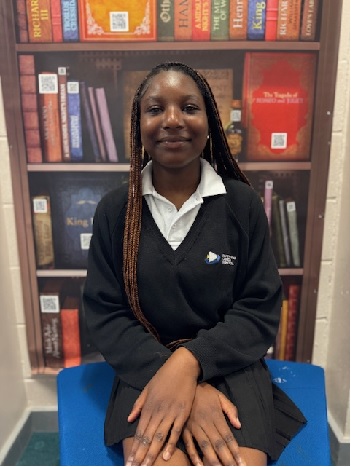
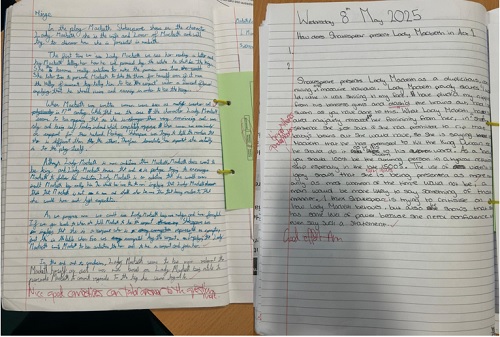
ACTOR OF THE WEEK
Ese in Y9 who performs in all the school performances and is an excellent Macbeth in the classroom! Well done Ese!
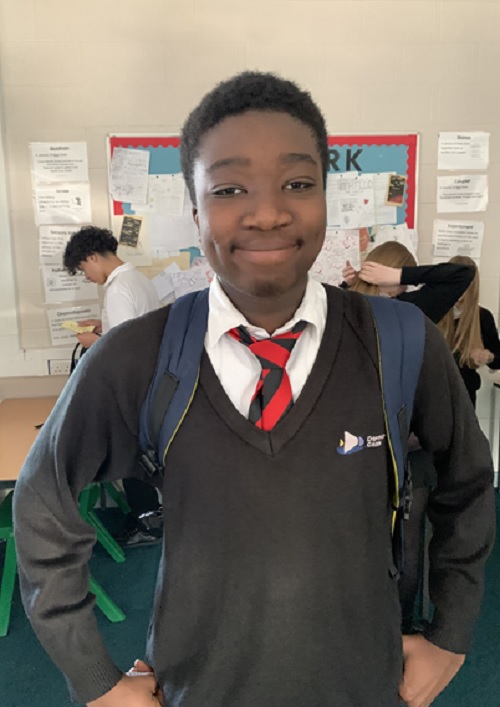
STAR OF THE WEEK
Mille in Y9 for always working so hard, answering questions with a thoughtful intelligence, and for writing excellent essays. Well done Millie!
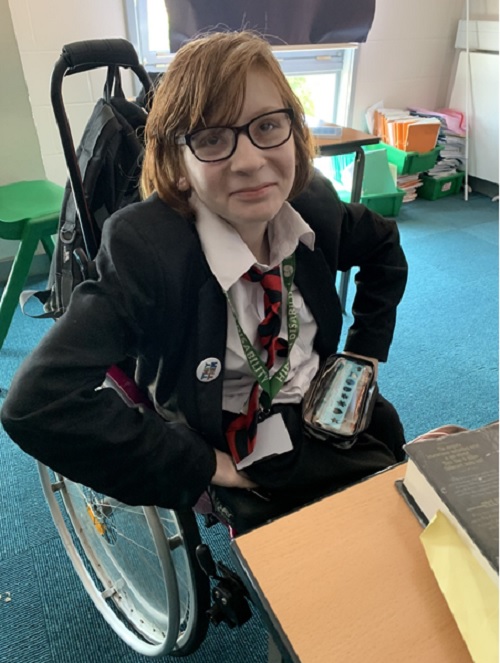

KS4 NEWS
KS4 STAR OF THE WEEK
Asosa (far left) with her English classmates, Chelsea,, Zeynep, Aryan, Holly, Bo and Helen working hard in their last lesson before their Literature Paper 2 exam.
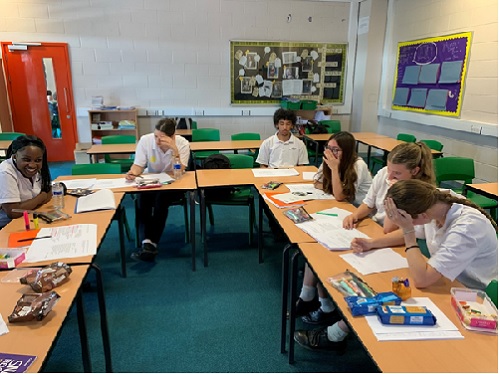
Y10 PPE'S
In Summer Term #2, Y10 will have their first round of PPE exams. Please help your young people to prepare for this by creating a revision schedule to follow at home. Make sure to build in lots of breaks! Recent studies have shown how important social time and fun are for aiding study and revision by helping to reduce anxiety. Sleep, hydration, and a nutritious diet will be key during the exam period. Extra practice papers and revision materials will be available via class teachers and on ClassCharts. The students will be sent home with a booklet containing some tasks to help prepare them for the PPE'S. This will be used in class after half-term – so needs to be brought back to school!
The papers:
English Language Paper 2 (1hr 45 mins)
- 1 hr 45 mins
- Read and analyse 2 non-fiction texts
- Write a piece of persuasive writing – a letter, speech or article
- 80 marks
English Literature – Paper 2 (2hr 15 mins)
Y11 NEWS
The English team recognise the immense efforts of Y11 this year, and during the recent PPES, and are proud of our students. Y11 have been working extremely hard, and it was a joy to see them come out of the first exam buzzing with excitement.
Key dates for the next English exams:
- LITERATURE PAPER 2: TUESDAY, 20th MAY.
This is the longest exam and has the most parts. An Inspector Calls, Power and Conflict poetry, and the Unseen poetry component. Y11 have taken this paper twice before as PPES, so will feel prepared. I would advise revising the themes in the poems by making links between them, learning key quotes, themes and messages, and some contextual information for each poem. For An Inspector Calls, revising key quotes (alongside characters and themes) will be vital as the students will not have the text in the exam.
- LANGUAGE PAPER 1: FRIDAY 23rd May
Fiction paper: 1 extract to read. Four reading questions and one longer writing question.
- LANGUAGE PAPER 2: FRIDAY 6th JUNE (AFTER HALF-TERM)
Non-fiction paper: 2 extracts to read. Four reading questions and one longer transactional writing task (speech, letter, or article).
The students will be given a Language Paper 2 practice paper to complete over the half-term break and then will spend the week before the final English exam preparing in class. Luckily, they will not lose too many English lessons to other exams. Extra practice papers and revision materials will be available on ClassCharts. Please congratulate them on their impressive start to the exam period!

Y10 MACBETH TRIP
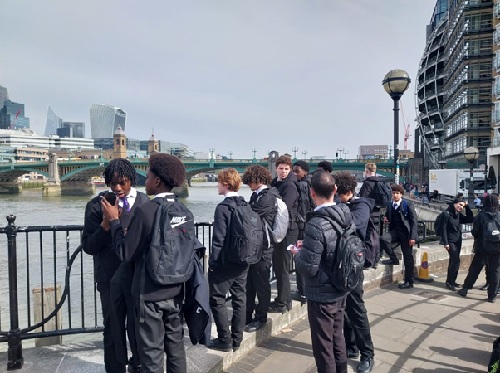
"Life's but a walking shadow, a poor player that struts and frets his hour upon the stage and then is heard no more: it is a tale told by an idiot, full of sound and fury, signifying nothing." Except if you’re a Y10 student!
The English department took the entire year group to a performance of the Scottish play at the home of the immortal bard himself, The Globe. The year group were treated to a magnificent spectacle in which swords were swished, witches meddled with mortals, the natural order was disturbed (that might have been my class on the bus), and heads rolled. We were lucky not to be stuck with the groundlings below and were perched high up in the heavens, with seats! When Shakespeare is taught in class from the page, it can sometimes seem hard going on a hot Friday afternoon. To see a live production allows the students to see the text differently, full of the drama, humour, and action that Shakespeare intended. In the next half-term, we intend to take a smaller group to see Romeo and Juliet at The Globe.

ENRICHMENT IN ENGLISH
CREATIVE WRITING CLUB
Recently, I have been using the online platform Padlet to enhance student engagement and foster a more collaborative approach to learning in English. My Y10 class have been submitting their weekly homework - analytical paragraphs on key scenes from Romeo and Juliet - via a dedicated Padlet page. Students are then encouraged to comment on questions and add deeper ideas on each other’s analyses, creating an environment wherein it becomes second-nature for students to peer/self-assess, offer support, and ask higher-order questions to their classmates.
Members of my Poetry and Short Stories club have also been using their Padlet page in their own time to workshop and receive constructive feedback on their works-in-progress, as well as post prompts to give other students inspiration and ideas for their creative writing. This has empowered them to feel more confident sharing their work and encourages collaboration between our budding authors!
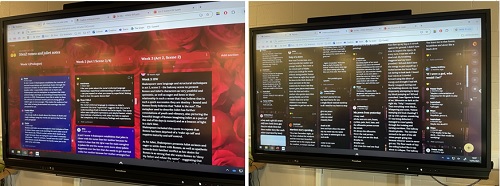
MUSIC JOURNALISM CLUB
Ms Philp from the English department and Mr Woodgate from History are meeting with all year groups on Friday afternoons to listen to, discuss and review some of the albums from the 100 greatest album list. It’s a great opportunity for students – and teachers – to hone their writing skills as we write up a review of each album a week. Mostly, it’s a chance to hang out and discuss what works for us and what doesn’t about some of the most well-liked music of the last 50 or so years. We listen to one album per week, and coming up are Kid A, Highway 61 Revisited and Hounds of Love! If that sounds like your thing, the budding music journalists can be found in room 406 on Friday afternoons from 3pm-4pm.

Here's a review of Paul Simon’s Graceland and its entirely student written after a bit of discussion last Friday. Thanks to all who came to help!
We didn’t necessarily expect to like this album because it’s from the 80s and I usually listen to more modern stuff, but Graceland by Paul Simon actually surprised me.
The album is kind of a mix of pop, rock, and African music, which sounds weird at first, but it really works. The rhythms are super catchy, especially on songs like “You Can Call Me Al” – that one’s definitely my favourite. The bass solo in it is honestly so fun and I couldn’t stop humming it after. It’s got this joyful energy that makes you want to dance even if you have no idea what he’s singing about.
Paul Simon’s voice isn’t like huge or dramatic, but it’s really calm and smooth, and it fits the songs perfectly. Some of the lyrics are a bit confusing, but they sound cool anyway. In “Graceland” (the song), he talks about going to Elvis Presley’s old home, but it’s really about something deeper, like family and memories. It makes you think.
One thing I learned from this album is how music from different countries can mix together to make something completely new. He worked with South African musicians, and their instruments and beats make this album stand out a lot. It also made me want to look up more about the history of when it was made, because it was during apartheid in South Africa, which is a pretty serious topic.
Overall, Graceland is way better than I thought it would be. It’s different from most things I listen to, but I’d say give it a go, especially if you’re into trying music that sounds unique. I’d give it 8.5 out of 10!